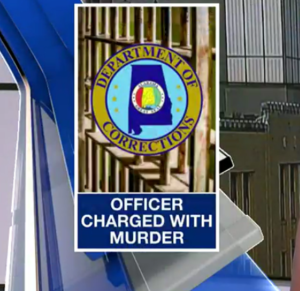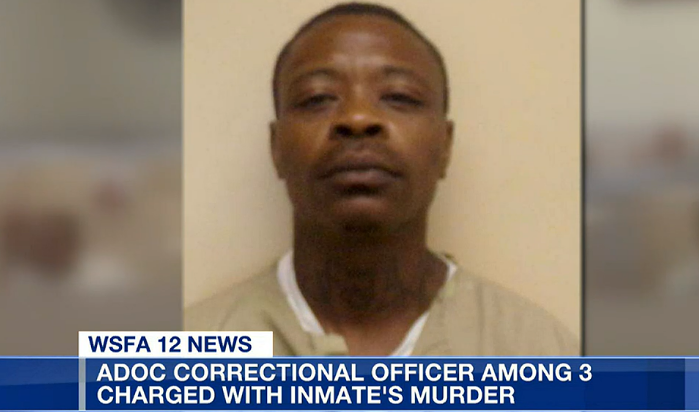Photos: Video Screenshots
Rubyn Murray, 38, (shown above) was murdered Wednesday at Elmore Correctional Facility in Central Alabama. He had served nearly 18 years of a 20 year sentence for stealing $125 in a robbery of a Stop N Go in 2005. He would have ended his sentence in 2025.

According to multiple reports received by EJI, Mr. Murray was involved in an altercation with a female officer at Elmore earlier in the day. Sergeant D’Marcus Sanders, a supervisor who has worked for the Alabama Department of Corrections since August 2017, then reportedly ordered other incarcerated people to assault Mr. Murray in retaliation.
Mr. Murray was taken to a holding cell at the back of the prison, where he was beaten and officers were told to ignore his pleas for help. Mr. Murray was eventually found unresponsive and died at Jackson Hospital later that day.
ADOC subsequently issued a press release confirming many of these details. On Thursday, Mr. Sanders was booked into the Elmore County Jail and charged with murder.
The culture of violence and abuse of power at Elmore has been documented repeatedly by EJI over the past 10 years.
EJI filed a complaint with the Department of Justice in 2013 after an investigation revealed a pattern of excessive physical violence at Elmore, where correctional staff at the highest levels have been found to have engaged in extreme and excessive violence against incarcerated men.
EJI found that a group of officers were taking men into isolated areas of the prison where they were handcuffed, stripped naked, and beaten. Several incarcerated men were beaten so severely they required hospitalization and suffered permanent injuries. The warden and other high-ranking prison officials were implicated in some of the beatings and misconduct.
In 2017, 35-year-old Billy Smith died of blunt force trauma to the head after he was assaulted by incarcerated men and officers at Elmore/Staton in 2017.
Officers hogtied Mr. Smith and left him on the ground outside the Elmore shift office for several hours as he cried for help and vomited on himself. According to multiple credible sources, a lieutenant, sergeant, and several officers were in the shift office when the assault occurred.
One of the officers involved, Jeremy Singleton, was promoted to sergeant eight months after Mr. Smith’s death before he eventually was charged with manslaughter in 2020. According to prosecutors, Mr. Singleton struck Mr. Smith multiple times on his head and failing to seek timely medical attention for him.
In 2019, Sergeant Ulysses Oliver beat two handcuffed and unresisting prisoners at Elmore with his fists, feet, and collapsible baton while his supervisor, Lieutenant Willie Burks, stood by and watched.
According to federal prosecutors, “Despite having the duty, ability and opportunity to intervene to stop Oliver from beating the second inmate, Burks only stood by and said, ‘it’s fair.’ Other ADOC correctional staff who reported to Burks were present for some or all of the assaults, but none intervened to stop Oliver from beating the inmates.”
In 2022, Elmore officer Ell White was caught on camera beating an unresisting man who had climbed onto the roof of the prison chapel. Prior to this assault, Mr. White had been named in several complaints charging that prison guards used excessive force against people in their custody, including Billy Smith.
Former officers and staff have reported that abuse and excessive use of force in confronting non-threatening incarcerated men is commonplace. They identified the failure of leadership to hold abusive officers accountable as a principal reason officers and staff resign.
One officer reported that, on his second day as an officer, he saw his fellow correctional officers pull a man off his bunk, beat him, and drag him through the dorm. During such assaults, cadets were instructed to leave the area and not intervene, which led many cadets to accept the abuse as part of the system’s operation.
An investigation by the Department of Justice found excessive force by officers at 12 out of the 13 men’s prisons in Alabama. A lawsuit filed by the DOJ remains ongoing.








